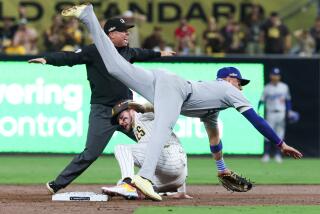Inside Moves Have Braves on the Run : Atlanta: Blunders on the basepaths are crucial in 3-2 setback.
- Share via
TORONTO — The Atlanta Braves should have guessed they were destined to spend the evening looking like startled deer after Joe Carter hit his 405-foot home run in the fourth inning.
Moments after the ball landed in the left-field seats, giving the Toronto Blue Jays a 1-0 lead in Game 3 of the World Series, Mark Lemke nearly jumped out of his stirrups.
He wasn’t bothered by the home run, he was scared to death of the fireworks sprouting from the center-field ceiling.
“I thought, ‘Where in the hell are those things coming from?’ ” Lemke said. “I thought, ‘Is Otis (Nixon) setting something off in center field?’ ”
It was that way for nine innings for a franchise that has not won a World Series game on the road in 34 years. There was seemingly nothing that didn’t catch them by surprise.
“Fans pay to see games like this,” Jeff Blauser said. “But it’s tough to be a player in a game like this.”
In some ways, their 3-2 loss to the Blue Jays was like their last World Series loss on the road.
In Game 7 in 1992, Lonnie Smith’s baserunning blunder led to the Minnesota Twins’ victory.
On Tuesday, the Blue Jays were helped by a near triple play, a baserunning mistake by David Justice and a blown hit-and-run in the ninth inning.
It started in the top of the fourth inning, with what Atlanta Manager Bobby Cox called “the play that turned the game around.”
With none out in a scoreless tie, Deion Sanders beat out a bouncer to pitcher Juan Guzman and Terry Pendleton singled to right.
Justice then hit a line drive to deep center field. As Devon White sprinted toward the fence in pursuit, Pendleton sprinted toward second.
One problem. Sanders, who is faster than either of them, didn’t move.
By the time White had made a leaping, on-the-dead-run catch against the center-field wall, Pendleton had rounded second base and passed Sanders without ever seeing his teammate.
“I never thought he would catch it,” Pendleton said. “I turned one way to look at the ball, then I turn the other way and Deion is passing me .”
Pendleton was immediately ruled out, but he correctly figured the Blue Jays wouldn’t notice the umpire, so he ran back to first, hoping to draw a wild throw that would help Sanders advance.
This maneuver almost led to the second triple play in World Series history, and the first since Bill Wambsganss pulled an unassisted triple play for the Cleveland Indians against Brooklyn in 1920.
Sanders thought about taking third on the throw to first. But first baseman John Olerud quickly threw the ball to catch Sanders in a rundown.
It appeared Kelly Gruber, the third baseman, tagged Sanders on the foot as they both dived toward second, but umpire Bob Davidson ruled Sanders safe.
Justice was in the middle of it again in the eighth, after the Braves had taken the lead on Lonnie Smith’s run-scoring single.
Justice began the play on first base and attempted to take third when Candy Maldonado bobbled the ball in left field. Maldonado made a perfect throw, and Justice ended the inning standing several feet off third base while Gruber gently applied the tag.
“I figured there was no way Maldonado would hear Manny Lee telling him to go to third base,” Justice said.
Blauser also figured incorrectly in the ninth, when he held back his swing on a 2-and-2 pitch that ended up in the dirt.
“I thought there is no way they would ever say I swung,” Blauser said.
First base umpire Dan Morrison proved him wrong, calling him out on an appeal after Pat Borders threw out a runner attempting to steal a base for only the third time in 28 attempts this postseason.
“We aren’t worried,” Blauser said. “We’ve been in this situation before.”
More to Read
Go beyond the scoreboard
Get the latest on L.A.'s teams in the daily Sports Report newsletter.
You may occasionally receive promotional content from the Los Angeles Times.











